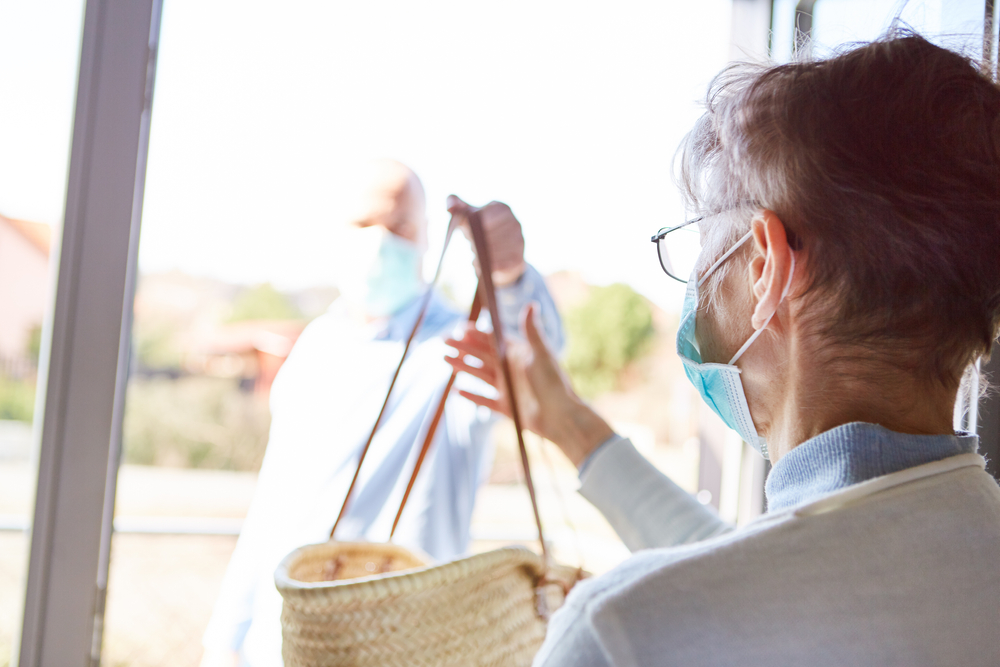Quarantine life continues for the zillionth day, and it’s a stressful time for everyone. We’re all feeling antsy and wondering when we can resume our social activities and see our friends and family again. While these times are undoubtedly frustrating, it’s key to remember why we’re doing this. While COVID-19 infects people of all ages, according to the World Health Organization (WHO), there are two groups of people at a higher risk of getting severe COVID-19 disease: those people over 60 years old and those with preexisting medical conditions.
“It’s easy to feel isolated living with a chronic illness, like kidney disease, on a normal day, but with social distancing and stay-at-home orders in place, it’s even easier to feel alone at this time,” Mike Spigler, Vice President of Patient Services and Kidney Disease Education from the American Kidney Fund, tells SheKnows. “There are many things we can do to help our loved ones living with chronic illnesses, but it’s important to remember that our friends, family members and neighbors with weakened immune systems are more susceptible to complications from COVID-19.”
Which is why it’s important to remember our at-risk friends and family during quarantine. If you’re wondering how to support your at-risk loved ones at this crucial time, we reached out to a number of experts for their best tips.
Offer to do their grocery shopping
“If you’re able to do the grocery shopping for a loved one with a chronic illness, it would help limit their possibility of being exposed to the virus,” says Spigler. “It’s also important to understand how their underlying condition affects their diet.” For example, someone living with kidney disease needs to closely monitor the amount of potassium in their diet. So it’s always a good idea for your loved one to create a shopping list and for you to stick to it.
Understand their fears
Katy Huie Harrison, PhD, owner and author of Undefining Motherhood, who has Common Variable Immune Deficiency (CVID) and is significantly at a greater risk for respiratory infections, tells SheKnows: “There’s one major thing I wish people would do that I don’t expect experts to tell you, but that it’s essential for people to know: understand my fear and do not act like I’m overreacting.”
Because her illness is invisible, Harrison says people see her as a perfectly healthy 30-something. “They make jokes about the caution I’m taking and roll their eyes when I insist that it’s not excessive. I’ve heard this same complaint from countless other people with silent illnesses, many of which place them in the ‘high risk’ category for COVID.”
So even if you don’t understand why your at-risk friend is taking the precautions she is, support her anyway.
Acknowledge how they feel
Dana McNeil LMFT, Founder of the Relationship Place, recommends refraining your at-risk friends and family from telling them you “know how they feel.”
“Each of our experiences illness in different ways so you can’t really know how someone feels,” she says. “It comes across like you are minimizing the pain they are experiencing because you have survived something similar and are just fine. This suggests that if your friend or family member is struggling with their symptoms that you might be judging them or believe they aren’t as strong as you are.”
Instead McNeil suggests letting your loved one know that you hear them and acknowledge how difficult things are for them. “That sounds supportive versus comparative.”
Offer to pick up their medication
“Medication is also another major aspect of living with a chronic illness,” says Spigler. “Know what medications your loved one is taking and see if you can help them get an extra supply.” Spigler adds that it’s common to see medical supplies and food running low at this, so if this is the case, he suggests helping our loved one create a back-up plan for their necessary foods and medical supplies.
Bring the essentials to them
On a similar note Harrison advises bringing the essentials that can’t be purchased online to your at-risk friends and family. “Things like toilet paper and disinfectant are largely available in stores only, especially early in the morning. Since we can’t go to these stores (or send our family members for risk of exposure), we’re struggling to get these basic supplies,” she says. And when you deliver them, do it contact-free, of course.
Let them know you’re here to help
McNeil says if you’re struggling to figure out how to help your at-risk friends and family, she says something like, “Call me if there is something I can do” isn’t very helpful.
“This just feels awkward to the person on the receiving end. If someone is sick, they don’t want to guess what things you might or might now be willing to do for them,” she says. “Also, it takes some pride to ask for help. It is easier for everyone if you offer to do something specific, like to run to the grocery store for them or take their dog for a walk.”
She recommends letting your family member know that you notice all of the tasks they have on their plate and what you are willing to help them with.
Originally published on SheKnows.
Follow us here and subscribe here for all the latest news on how you can keep Thriving.
Stay up to date or catch-up on all our podcasts with Arianna Huffington here.


